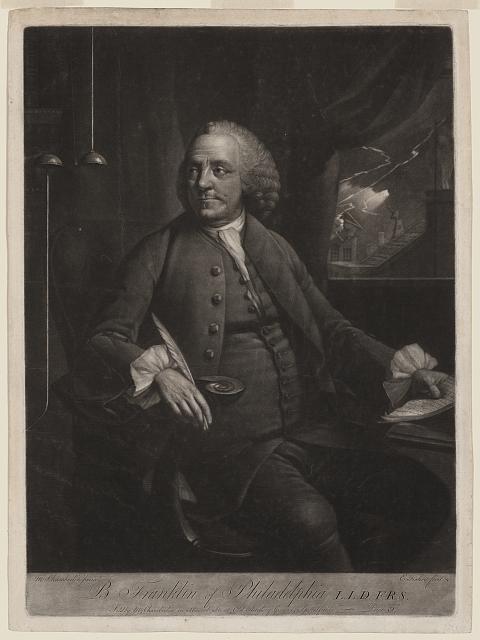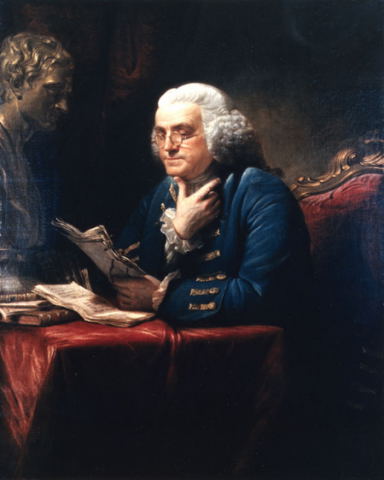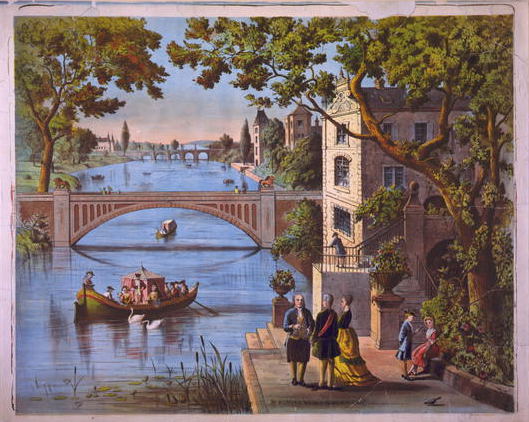 Benjamin
Franklin
Benjamin
Franklin
 Benjamin
Franklin
Benjamin
Franklin
A true Renaissance man, Franklin lived life with great zeal,
From America to Europe, his clever wit owned appeal.
To say Ben Franklin (1706-1790) lived a very useful life is an understatement. With no formal education beyond the age of 10 years, Franklin was welcomed in any Royal Court and sought out by every prestigious society.
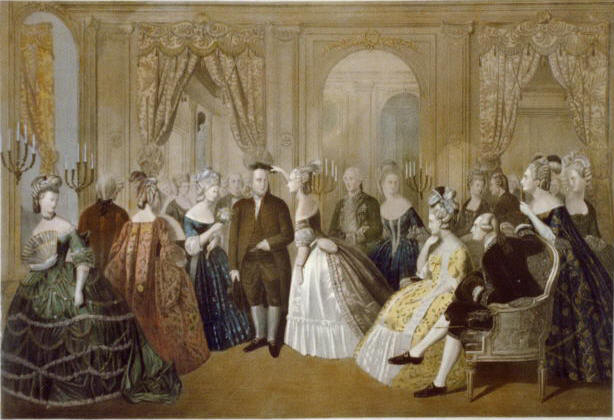
Franklin's Reception at the Court of France, 1775 Picture courtesy of ushistory.org
Among his many accomplishments, he was first employed
as a candlemaker
![]() for two
years, learned the art of printing to work in Boston, Philadelphia, and London.
He next became a printer and publisher in Philadelphia where he founded the
Pennsylvania Gazette (1728), and later began the publication of Poor
Richardís Almanac. He was clerk of the Pennsylvania general assembly
1736-1750; postmaster of
Philadelphia in 1737, founded the American Philosophical Society in 1743, a
member of the provincial assembly 1744-1754,
a member of several Indian commissions, recognized for his scientific
discoveries, elected a member of the Royal Society,
for two
years, learned the art of printing to work in Boston, Philadelphia, and London.
He next became a printer and publisher in Philadelphia where he founded the
Pennsylvania Gazette (1728), and later began the publication of Poor
Richardís Almanac. He was clerk of the Pennsylvania general assembly
1736-1750; postmaster of
Philadelphia in 1737, founded the American Philosophical Society in 1743, a
member of the provincial assembly 1744-1754,
a member of several Indian commissions, recognized for his scientific
discoveries, elected a member of the Royal Society,
 deputy postmaster general of the
British North American Colonies 1753-1774,
agent of Pennsylvania in London 1757-1762
and 1764-1775, member
of the Continental Congress 1775-1776,
president of the Pennsylvania constitutional convention of 1776, diplomatic
commissioner to France and Minister to France
1776-1785, helped negotiate treaty of peace with Great
Britain, president of the executive council of Pennsylvania
1785-1788, president of the
trustees of the University of Pennsylvania; delegate to the Federal Convention
in 1787. Also of special note, he was one of
the earliest and strongest advocates for the abolition of Slavery (President of
Pennsylvania Society for the Abolition of Slavery,
1785) and for the protection
of the rights of American aboriginal peoples.
He received honorary Doctor of Laws from the Universities of Edinburgh and
Oxford.
deputy postmaster general of the
British North American Colonies 1753-1774,
agent of Pennsylvania in London 1757-1762
and 1764-1775, member
of the Continental Congress 1775-1776,
president of the Pennsylvania constitutional convention of 1776, diplomatic
commissioner to France and Minister to France
1776-1785, helped negotiate treaty of peace with Great
Britain, president of the executive council of Pennsylvania
1785-1788, president of the
trustees of the University of Pennsylvania; delegate to the Federal Convention
in 1787. Also of special note, he was one of
the earliest and strongest advocates for the abolition of Slavery (President of
Pennsylvania Society for the Abolition of Slavery,
1785) and for the protection
of the rights of American aboriginal peoples.
He received honorary Doctor of Laws from the Universities of Edinburgh and
Oxford.
Now he that planteth and he that watereth are one: and every man shall receive his own reward according to his own labour.
I Corinthians 3:8
In 1748, as Pennsylvania's Governor, Benjamin Franklin proposed Pennsylvania's first Fast Day:
"It is the duty of mankind on all suitable occasions to acknowledge their dependence on the Divine Being... [that] Almighty God would mercifully interpose and still the rage of war among the nations...[and that] He would take this province under his protection, confound the designs and defeat the attempts of its enemies, and unite our hearts and strengthen our hands in every undertaking that may be for the public good, and for our defense and security in this time of danger."
In his pamphlet, Information to Those who would Remove to America,
a guide for Europeans who were thinking of relocating in America, he said:
"Hence bad examples to youth are more rare in Am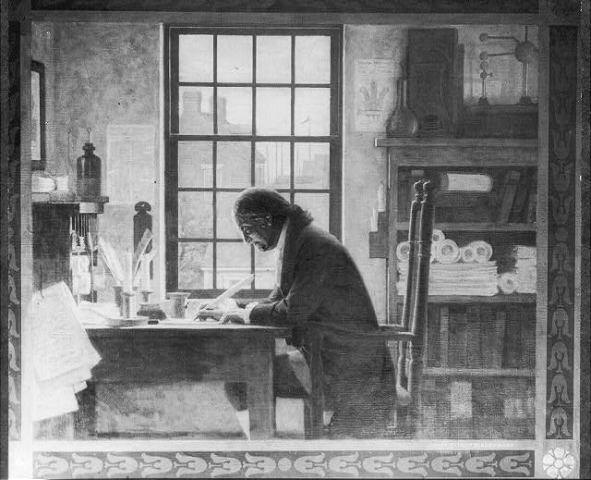 erica,
which must be comfortable consideration to parents. To this may be truly added,
that serious religion, under its various denominations, is not only tolerated,
but respected and practiced...Atheism is unknown there; Infidelity rare and
secret; so that persons may live to a great age in that country without having
their piety shocked by meeting with either an Atheist or an Infidel.....And the
Divine Being seems to have manifested his approbation of the mutual forbearance
and kindness with which the different sects treat each other; by the remarkable
prosperity with which he has been pleased to favor the whole country......Here
is my Creed. I believe in one God, the Creator of the Universe. That He governs
it by His Providence. That he ought to be worshipped."
erica,
which must be comfortable consideration to parents. To this may be truly added,
that serious religion, under its various denominations, is not only tolerated,
but respected and practiced...Atheism is unknown there; Infidelity rare and
secret; so that persons may live to a great age in that country without having
their piety shocked by meeting with either an Atheist or an Infidel.....And the
Divine Being seems to have manifested his approbation of the mutual forbearance
and kindness with which the different sects treat each other; by the remarkable
prosperity with which he has been pleased to favor the whole country......Here
is my Creed. I believe in one God, the Creator of the Universe. That He governs
it by His Providence. That he ought to be worshipped."
Picture courtesy of ushistory.org
CHRISTIANITY and THE CREATION OF HOSPITALS Christians, out of a desire to please God and obey His commands, saw the need for a special house that the sick and needy could use as a retreat while they recovered.
Though the Greeks and Romans took care of the sick or wounded in various homes, there was no central place to which all those needing care could go.
By the 4th century AD, newly Christianized Romans began running places specifically for the sick and needy. By the 8th century, Christian hospitals became specialized in their functions. Some served the sick, some the needy or orphans, lepers, or the insane.
By the 12th century, the Christian Order of St. John of Jerusalem and also the St. Augustine nuns, had molded Medieval hospitals into fine institutions.
Control of the institutions shifted away from the Church during the late 13th century. Secular hospitals grew increasingly crowded and dirty. Those who could afford better did not go to those hospitals.In 1751 a Dr. Thomas Bond went to Ben Franklin and asked him for help in forming Philadelphia's first true hospital. A small building went up with words from the story of the Good Samaritan, "Take care of him and I will repay thee. That building is now the East Wing of Pennsylvania Hospital.
Benjamin Franklin:
When Benjamin was eleven, his young fertile mind was influenced by Cotton Mather's book, Essays to do Good. His older brother James was a printer and published the New England Courant, which he used to criticize Cotton Mather's ideas on different issues. During the smallpox epidemic of 1721, Mather tried to have people "inoculated," a practice he learned from his African servant.* James found such an idea outrageously irresponsible.
Ben worked with James as an apprentice until he was seventeen and moved to Philadelphia to be a journeyman printer. The next year, he came back to Boston, and the first thing he did was to visit Cotton Mather. Mather was most gracious to Ben, making no mention of his brother's attacks on him. When Franklin left, he bumped his head on Mather's doorjamb. Mather reflected out loud to Franklin that he was a young man with the world ahead of him. He must learn to stoop in order to miss the hard thumps of life. Franklin learned a lesson of pride and observed throughout his life how many people met misfortune because they held their heads too high with pride.
Franklin appreciated Mather in the realm of scientific knowledge and medicine. For example, Mather had written about spontaneous hybridization in plants. Mather himself admired and was guided in method by the work of Sir Isaac Newton.
"I never doubted, for instance, the existence of the Deity; that he made the world, and governed it by his Providence; that the most acceptable service of God was the doing good to man; that our souls are immortal; and that all crime will be punished, and virtue rewarded either here or hereafter." from Franklin's autobiography
In 1751, Franklin learned that Philadelphia needed a hospital, something new in the colonies. Through great persuasive abilities, Ben Franklin was able to motivate his Christian friends and neighbors with help from the colonial legislature to work together and create the first hospital.
*Cotton Mather named the African-born man Onesimus, which comes from a Greek word meaning "useful." Onesimus described the procedure common to Africa where pus from a smallpox sore is placed into a cut in the arm of a non-infected person. This should allow the non-infected person to develop a resistance to smallpox. One doctor tried it first on his son and two slaves. Eventually, Dr. Zabdiel Boylston and two other doctors inoculated about 300 Bostonians. The death rate dropped from 1-in-12 to 1-in-40.
"His reputation was more universal than that of Leibnitz or Newton, Frederick or Voltaire, and his character more beloved and esteemed than any or all of them. Newton had astonished perhaps forty or fifty men in Europe; for not more than that number, probably, at any one time had read him and understood him by his discoveries and demonstrations. And these being held in admiration in their respective countries as at the head of the philosophers, had spread among scientific people a mysterious wonder at the genius of this perhaps the greatest man that ever lived. But this fame was confined to men of letters. The common people knew little and cared nothing about such a recluse philosopher. Leibnitz's name was more confined still. Frederick was hated by more than half of Europe as much as Louis XIV was, and as Napoleon is. Voltaire, whose name was more universal than any of those before mentioned, was considered as a vain, profligate wit, and not much esteemed or beloved by anybody, though admired by all who knew his works.
But Franklin's fame was universal. His name was familiar to government and people, to kings, courtiers, nobility, clergy and philosophers, as well as plebeians, to such a degree that there was scarcely a peasant or a citizen, a valet de chambre, coachman or footman, a lady's chambermaid or a scullion in a kitchen who was not familiar with it, and who did not consider him as a friend to human kind. ....To develop that complication of causes which conspired to produce so singular a phenomenon is far beyond my means or forces.....
Franklin had a great genius, original, sagacious and inventive, capable of discoveries in science no less than of improvements in the fine arts and the mechanic arts. He had a vast imagination, equal to the comprehension of the greatest objects, and capable of a steady and cool comprehension of them. He had wit at will. He had humor that, when he pleased, was delicate and delightful. He had a satire that was good-natured or caustic, Horace or Juvenal, Swift or Rabelais, at his pleasure. He had talents for irony, allegory and fable that he could adapt with great skill to the promotion of moral and political truth. ....Had he been blessed with the same advantages of scholastic education in his early youth, and pursued a course of studies as unembarrased with occupations of public and private life, as Sir Isaac Newton, he might have emulated the first philosopher." from Works of John Adams, I, 659-661, 663-664.
We have been assured, Sir, in the Sacred Writings, that "except the Lord build the House, they labor in vain that build it." I firmly believe this; and I also believe that without his concurring aid we shall succeed in this political building no better than the Builders of Babel: We shall be divided by our partial local interests; our projects will be confounded, and we ourselves shall become a reproach and bye word down to future ages. And what is worse, mankind may hereafter from this unfortunate instance, despair of establishing Governments by Human wisdom and leave it to chance, war and conquest. Benjamin Franklin
I therefore beg leave to move--that henceforth prayers imploring the assistance of Heaven, and its blessing on our deliberations, be held in this Assembly every morning before we proceed to business, and that one or more of the clergy of this city be requested to officiate in that service. Benjamin Franklin
Slavery is such an atrocious debasement of human nature, that its very extirpation, if not performed with solicitous care, may sometimes open a source of serious evils. Benjamin Franklin, 1789
If men are so wicked with religion, what would they be if without it. Benjamin Franklin

The Bishop of St. Asaph, who enjoyed a friendship with Benjamin Franklin, admired the American cause. He wrote the following in 1774 to England.
My Lords, I look upon North America as the only great nursery of freemen now left upon the face of the earth. We have seen the liberties of Poland and Sweden swept away, in the course of one year, by treachery and usurpation. The free towns of Germany are like so many dying sparks that go out one after another, and which must all be soon extinguished under the destructive greatness of their neighbours. Holland is little more than a great trading company, with luxurious manners, and an exhausted revenue...Switzerland alone is free and happy within the narrow enclosure of its rocks and vallies. As for the state of this country, my Lords, I can only refer myself to your own secret thoughts. I am disposed to think and hope the best of Public Liberty. Were I to describe her, according to my own ideas at present, I should say that she has a sickly countenance, but I trust she has a strong constitution.
But whatever may be our future fate, the greatest glory that attends this country, a greater than any other nation ever acquired, is to have formed and nursed up to such a state of happiness those Colonies whom we are now so eager to butcher. We ought to cherish them as the immortal monuments of our public justice and wisdom; as the heirs of our better days of our old arts and manners, and of our expiring national virtues. What work of art, or power, or public utility, has ever equalled the glory of having peopled a continent without guilt or bloodshed with a multitude of free and happy commonwealths; to have given them the best arts of life and government, and to have suffered them under the shelter of our authority, to acquire in peace the skill to use them. In comparison of this, the policy of governing by influence, and even the pride of war and victory, are dishonest tricks and poor contemptible pageantry.
We seem not to be sensible of the high and important trust which Providence has committed to our charge. The most precious remains of civil liberty that the world can now boast of are lodged in our hands; and God forbid that we should violate so sacred a deposit. By enslaving your Colonies, you not only ruin the peace, the commerce and the fortunes of both countries, but you extinguish the fairest hopes, shut up the last asylum of mankind. I think, my Lords, without being weakly superstitious, that a good man may hope that heaven will take part against the execution of a plan which seems big not only with mischief but impiety.
Pictures below, courtesy of ushistory.org
